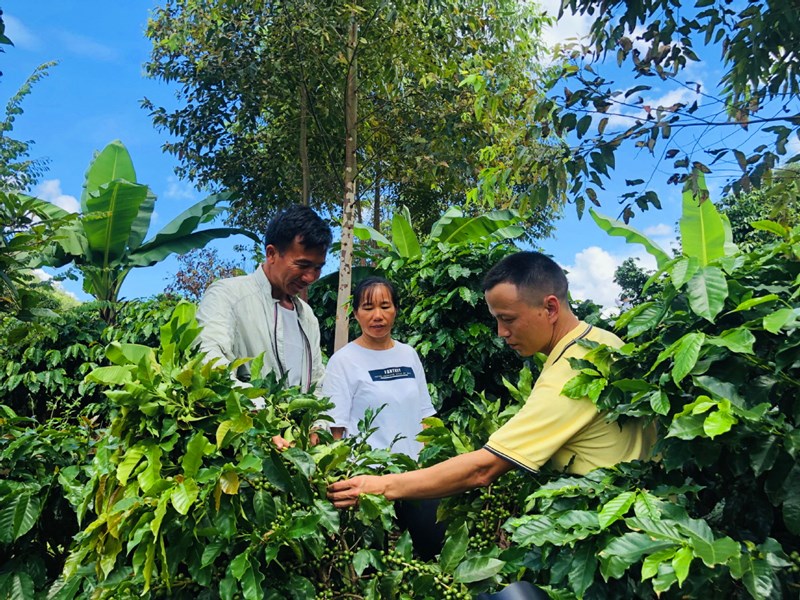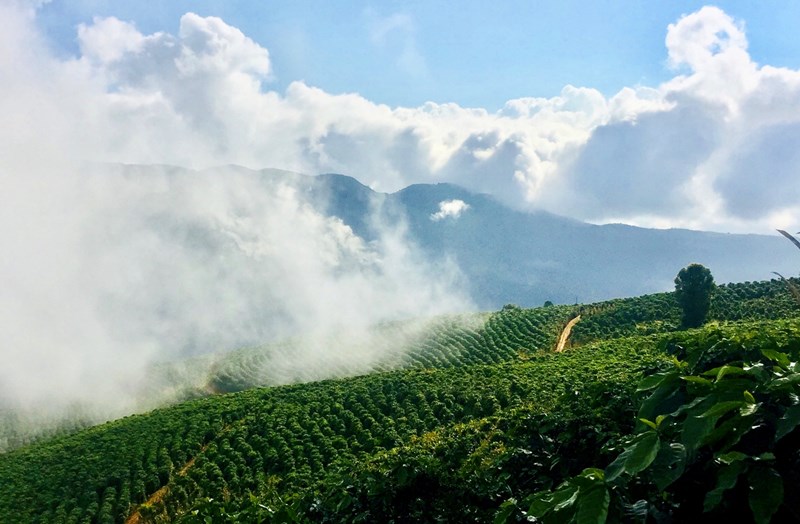Starbucks extends support to coffee farmers in Yunnan

Coffee farming expert (1st from right) from Starbucks Farmer Support Center gives instructions to local coffee growers in Yunnan province. (Photo provided to chinadaily.com.cn)
Cai Qingkai, who owns a coffee plantation in Yunnan province in Southwest China, found he had no workers for the upcoming harvest season early this year.
The sudden outbreak of the COVID-19 pandemic earlier this year had caused lockdowns at many villages in the province. As a result, migrant workers were unable to travel for coffee harvesting.
But the ripe coffee cherries couldn't wait.
Cai, who became a coffee grower 14 years ago, decided to work with his wife and two sons.
"We handpicked over 10 metric tons of coffee cherries day and night, as much as we could," he recalled.
In September, coffee beans from Cai's farm were selected to make reserved coffee for Starbucks' high-end stores in China. The packaged roasted beans are named after him as Qingkai Farm coffee beans, for the second year.
Meanwhile, coffee beans from farms of Pan Qizuo, a third-generation coffee grower in Yunnan province, were selected as reserved coffee beans. These two farms, and others in the province, have been supported by Starbucks Yunnan Farmer Support Center in Pu'er, Yunnan province. The center is the first such established in the Asia-Pacific in 2012, offering training and technology knowhow to local coffee growers.

Yunnan coffee plantation. (Photo provided to chinadaily.com.cn)
So far, the center has provided 24,000 personal times training, supporting more than 1,600 local coffee farms to pass for C.A.F.E. Practice, a verification program that measures farms and is designed to promote transparent, profitable and sustainable coffee growing practices while also protecting the well-being of coffee farmers and workers their families and their communities.
In eight years, Starbucks has rolled out high-end Yunnan coffee beans, with innovative roasting measures to reflect a whole new spectrum of coffee flavors and tastes to lead a new Guohuo trend.
Starbucks is also dedicated in growing along with the communities at local plants. Since 2017, Starbucks has continued its investment in Yunnan with China Foundation for Poverty Alleviation to improve lives and living conditions among local coffee growers, offer professional trainings, and provide health checks and study guidance for the next generations of poverty-stricken coffee growers.
It aims to expand its program to cover about 50,000 coffee farmers and 6,000 school-age children in the province. Its two phases of poverty alleviation programs have benefited one-third of the number of villages in their plan.
Localization in supply chain has played a pivotal role in Starbucks' businesses in China. The company has cultivated a farm-to-cup special coffee industry in China through continued investment in training and infrastructure.
In March, Starbucks China announced it will invest about $130 million in the country to open a roasting facility in 2022, part of its new Coffee Innovation Park to further strengthen the company's coffee supply in Asia.
"The Supply Innovation Park will set a blueprint for the future of coffee roasting and supply chain, and propel China's coffee industry to a whole new altitude, while opening Starbucks' next growth chapter in China, with China," said Belinda Wong, chairman and CEO of Starbucks China.
The investment highlights the company's ambition to further globalize its roasting network and reinforces Starbucks strategic focus on the United States and China as its two lead growth markets, the company said.
"The bold infrastructure investment further deepens Starbucks' multi-decade commitment to strengthen the specialty coffee industry in China, where it aims to have 6,000 stores by 2022," according to a statement.
Reporting by Wang Zhuoqiong; editing by Wang Jingzhong